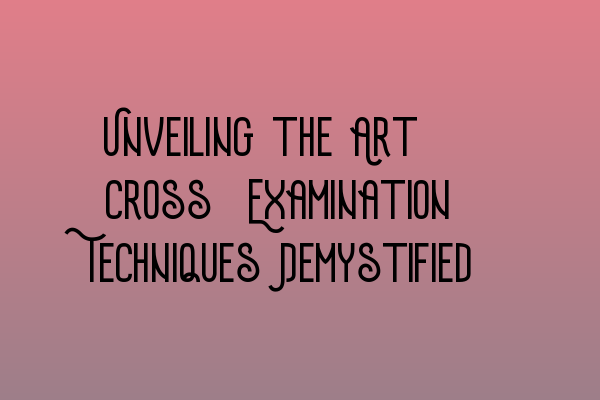Unveiling the Art: Cross-Examination Techniques Demystified
Welcome to the SQE Criminal Law & Practice UK blog! In this post, we will dive deep into the art of cross-examination techniques and explore how they can be effectively used in criminal law cases. Cross-examination is a crucial component of the legal profession, and understanding the strategies behind it can significantly impact the outcome of a case.
The Significance of Cross-Examination
Cross-examination is an essential tool that allows legal professionals to challenge the credibility and truthfulness of witnesses. It is an opportunity to expose inconsistencies, biases, and weaknesses in the opposing party’s testimony.
Effective cross-examination can not only weaken the opposing party’s case but also strengthen your client’s position. It involves asking precise and pointed questions that elicit favorable responses and cast doubt on the witness’s testimony.
However, mastering the art of cross-examination requires a deep understanding of the legal principles, rules of evidence, and persuasive communication skills. As criminal law attorneys, it is our duty to tirelessly work towards advocating for our clients’ rights and ensuring a fair trial.
Key Techniques for Successful Cross-Examination
1. Impeachment: Impeaching a witness is the act of discrediting their testimony by highlighting inconsistencies, prior statements, or biased motives. By carefully reviewing the witness’s statements and gathering evidence, you can effectively challenge their credibility and weaken their position.
2. Leading Questions: Leading questions are a powerful tool in cross-examination. By framing questions in a way that suggests the desired answer, you can control the witness’s testimony, elicit favorable responses, or expose contradictions. However, caution must be exercised to avoid objections and maintain credibility.
3. Control the Witness: It is crucial to maintain control over the witness during cross-examination. This can be achieved by using assertive questioning techniques, setting a fast pace, and avoiding open-ended questions. By taking control, you can guide the witness towards your intended narrative and highlight inconsistencies.
4. Listen and Adapt: Pay attention to the witness’s responses and adapt your strategy accordingly. This allows you to capitalize on unexpected answers, exploit contradictions, and maintain credibility. Flexibility and active listening are key to effective cross-examination.
Preparing for Cross-Examination
Successful cross-examination is heavily dependent on thorough preparation. Here are some steps to follow:
1. Familiarize yourself with the case: Understand all the facts, evidence, and legal principles involved. Identify the weak points in the opposing party’s case.
2. Develop a strategy: Determine the objectives of your cross-examination and plan the sequence of questions to achieve those objectives. Anticipate possible answers and formulate follow-up questions.
3. Gather evidence: Collect all the necessary evidence, documents, and prior statements that may be used to challenge the witness’s credibility or expose inconsistencies.
4. Practice, practice, practice: Hone your cross-examination skills through rigorous practice sessions. Mock trials and role-playing exercises can help refine your questioning technique and boost your confidence.
Remember, successful cross-examination requires a combination of legal knowledge, courtroom experience, and persuasive communication skills. By meticulously preparing and implementing effective techniques, you can present a strong case for your client.
For more information on criminal law practice and preparation for the SQE exams, check out our related articles:
- SQE 1 Practice Exam Questions
- SQE 1 Practice Mocks FLK1 FLK2
- SQE 2 Preparation Courses
- SQE 1 Preparation Courses
- SRA SQE Exam Dates
For further guidance and legal assistance, feel free to reach out to us at SQE Criminal Law & Practice UK. Our team of experienced criminal law solicitors is here to support you throughout your legal journey.
